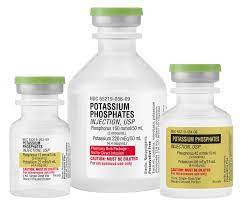Potassium phosphate is a mineral salt that has gained popularity in the medical field due to its various applications. This article will explore the uses, benefits, side effects, and warnings associated with potassium phosphate. It is important to note that the information provided here is for educational purposes only and should not be considered medical advice.
Uses
Potassium phosphate is commonly used in the treatment and prevention of low levels of phosphorus in the blood. Phosphorus is an essential mineral that plays a vital role in various bodily functions, including bone formation, energy production, and cell growth. Potassium phosphate supplements can help restore adequate phosphorus levels in individuals with deficiencies.
In addition to its role in phosphorus balance, potassium phosphate is also used in intravenous solutions to correct electrolyte imbalances. This is particularly important in patients with severe dehydration or those who have undergone extensive diuresis or insulin administration.
Benefits
The benefits of potassium phosphate are numerous. By restoring phosphorus levels in the body, it helps maintain healthy bones and teeth, promotes energy production, and supports various metabolic activities. This mineral is also essential for the proper functioning of the nervous system and the production of DNA and RNA.
Moreover, potassium phosphate plays a crucial role in promoting muscle function and contraction, making it invaluable for athletes and individuals engaged in physical activities. It helps regulate the pH balance within cells, ensuring optimal performance and reducing the risk of muscle cramps and fatigue.
Side Effects
While potassium phosphate is generally considered safe and well-tolerated, it may cause certain side effects in some individuals. Common side effects include nausea, vomiting, diarrhea, stomach cramps, and bloating. These effects are typically mild and transient, subsiding as the body adjusts to the supplement.
However, in rare cases, severe allergic reactions may occur, characterized by symptoms such as rash, itching, swelling, dizziness, and breathing difficulties. If any of these symptoms manifest, it is crucial to seek immediate medical attention.
Warnings
Before using potassium phosphate, it is important to be aware of certain precautions and warnings. Individuals with underlying medical conditions, such as kidney problems or electrolyte imbalances, should consult their healthcare provider before taking this supplement, as it may exacerbate these conditions.
Potassium phosphate may interact with certain medications, including diuretics and angiotensin-converting enzyme (ACE) inhibitors. Therefore, it is essential to inform your doctor about all current medications, both prescription and over-the-counter. They can guide you on the appropriate dosage and potential drug interactions.
Pregnant and breastfeeding women should also exercise caution when using potassium phosphate supplements. It is advisable to consult a healthcare professional to assess the benefits and potential risks associated with their specific situation.
Frequently Asked Questions
It is important to consult your healthcare provider before combining potassium phosphate with other medications, as it may have interactions that could affect their effectiveness or safety.
The time it takes to see results may vary depending on the individual and the specific condition being treated. It is advisable to follow your healthcare provider’s instructions and attend regular check-ups to monitor your progress.
Potassium phosphate supplements are typically taken with food to minimize the risk of gastrointestinal side effects. However, it is best to follow the specific instructions provided by your healthcare provider or on the product label.
While there are no specific dietary restrictions associated with potassium phosphate supplements, following a balanced diet that includes phosphorus-rich foods may help support the effects of the supplement. It is always best to consult a healthcare professional or registered dietitian for personalized advice.
It is not advisable to stop taking any medication or supplement abruptly without consulting your healthcare provider. They can guide you on the appropriate way to discontinue the supplement to avoid any potential adverse effects.
conclusion
In conclusion, potassium phosphate plays a crucial role in maintaining optimal phosphorus levels in the body, supporting various bodily functions, and correcting electrolyte imbalances. However, it is crucial to use this supplement under the guidance of a healthcare professional and to be aware of any potential side effects or interactions. Always consult with a medical expert before incorporating potassium phosphate into your healthcare regimen.


